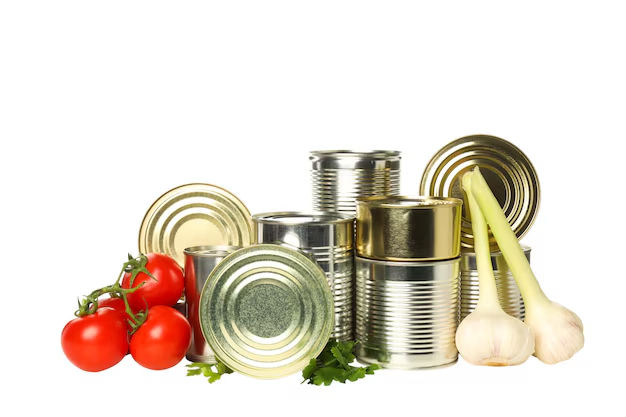Introduction
Dietitians say: certain canned foods, selected strategically, can pack in brain-boosting nutrients such as omega-3s, antioxidants and vitamins. Best of all, they’re inexpensive, shelf-stable and at the ready. Want to boost cognitive health like your superpower? So without further ado, let’s take a look at the 7 best canned foods according to experts!
Why Canned Foods? Debunking Myths
Before we get to the list, let’s clear up the elephant in the room: “Are canned foods healthy? Absolutely! Today’s canning retains nutrients well, and many brands are now low-sodium or BPA-free. Plus, canned foods are great at reducing food waste, plus they save time — something that’s key for busy lifestyles.
The 7 Best Canned Foods for Brain Health
Canned Wild Salmon
Why It’s Great:
Canned wild salmon is rich in omega-3 fatty acids (EPA and DHA), which support brain-cell structure and placate inflammation associated with cognitive decline. It’s also high in vitamin D, which modulates mood and memory.
Dietitian tip:
Choose bones-in varieties for a calcium bonus!
How to use:
Stir into salads, patties or spread on whole-grain crackers.
Sardines in Water or Oil
Why It’s Awesome:
These little fish deliver a punch of omega-3s, vitamin B12 and selenium — nutrients that support neurotransmitter function and safeguard against oxidative stress.
Dietitian Tip:
Opt for water-packed varieties to keep saturated fat in check.
How to Use:
Mix into pasta, spread onto toast, or eat directly from the tin as a quick snack.
Chickpeas (Canned Hummus Beans)
Why It’s Great: Chickpeas are high in fiber, folate and magnesium, helping to stabilize blood sugar, providing steady power for the brain. Folate is also helpful in lowering homocysteine, which has been associated with dementia.
Dietitian tip:
Rinsing can cut sodium intake by as much as 40%.
How to use:
Blend into hummus, roast for crunchy snacks or toss into soups.
Canned Tomatoes
Why It’s Wonderful: Rich in lycopene, a powerful antioxidant, tomatoes fight brain aging and improve vascular health. Cooking (as in canning) improves lycopene absorption!
Dietitian tip:
Choose “no salt added” varieties.
How to Use:
Stir into sauces, stews or Shakshuka.
Canned Pumpkin Purée
Why It’s Great: An excellent source of beta-carotene (which is converted into vitamin A), pumpkin guards against oxidative damage to brain cells from oxidative stress. It’s also rich in fiber for gut-brain axis health.
Dietitian tip:
It should be 100 percent pumpkin, not pie mix.
How to Use:
Sprinkle on oatmeal, blend into smoothies or cook into muffins.
Canned Coconut Milk
Why It’s Good: Includes medium-chain triglycerides (MCTs), which offer quick energy to the brain and may boost cognition in Alzheimer’s patients.
Dietitian Tip: Moderation is key; it’s high in saturated fat.
How to Use: Stir into curries, soups, or non-dairy desserts.
Canned Spinach
Why It’s Great: Canned spinach may not be as glamorous as fresh, but it contains iron, vitamin K and folate, essential for oxygenating the brain and making the neurotransmitters that facilitate communication between cells.
Dietitian advice: Combine with vitamin C (think tomatoes) to enhance iron absorption.
How to Use: Stir into lasagna, quiches or sauté with garlic.
Tips for Selecting Brain-Healthy Canned Foods
Mind Sodium: Look for “low-sodium” or “no salt added” labels. Sodium can be reduced further by rinsing.
Avoid BPA: Look for BPA-free linings to minimize chemical exposure.
Whole Foods First: No sauces or syrups; drink water, olive oil, or natural juices.
FAQs: Everything You Need to Know About Canned Food
Q1: Are canned goods just as nutritious as fresh?
A: Yes! Canning seals in nutrients at their freshest. Some (and you can see this particularly with things like tomatoes and pumpkin) even provide higher levels of antioxidant bioavailability!
Q2: What’s a good way to reduce sodium in canned beans?
A: Rinse beans under water for 1-2 minutes, which can cut sodium by as much as 40%.
Q3: Is canned fish a good substitute for fresh fish in my diet?
A: Absolutely! Canned fish such as salmon and sardines can be cheaper sources of omega-3s that fish like salmon provide.
Q4: Are there canned foods to avoid for brain health?
Q: What should I avoid when it comes to what foods to eat? Choose whole, minimally processed options.
Q5: What is the shelf life of canned foods?
A: The majority remain safe for 2–5 years, although nutrients can degrade a bit with time. Screen instantly for dings or rust.
Conclusion
Who knew your pantry could be a bounty for cognitive health? By stocking these dietitian-approved canned foods, you’re investing in a sharper, more resilient brain — without sacrificing convenience or taste. From fish loaded with omega-3 to tomatoes bursting with antioxidants, each bite takes you another step closer to getting those mental gears turning.
PRO TIP: Combine the above-mentioned food items with a healthy diet, water intake and regular exercises for increased brain benefits. Ready to get started? Your future self will be grateful for it!
Call to Action: If you liked this guide, Share it, send it to a friend or pin it for later! For tailored recommendations, talk to a registered dietitian. Read more







